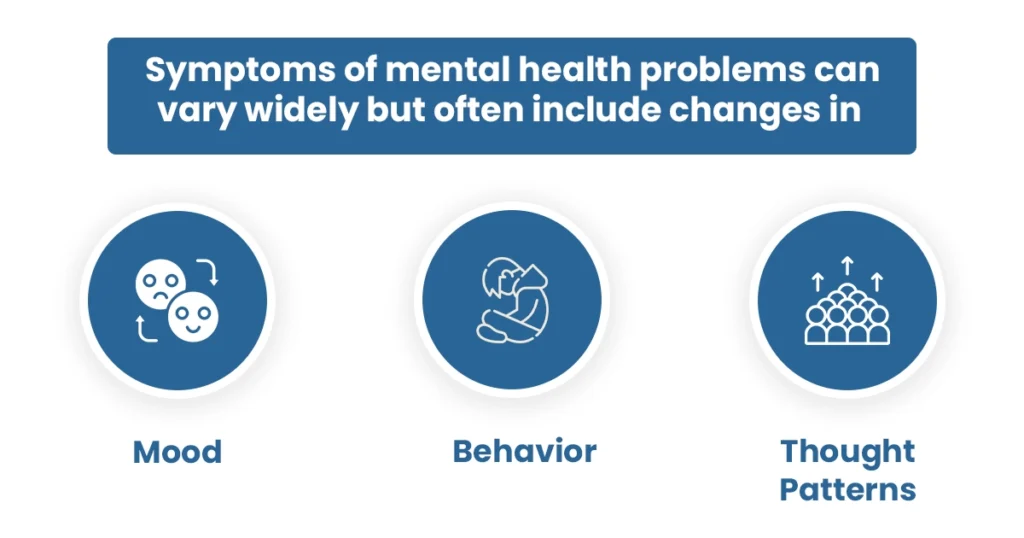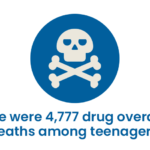
Mental health disorders affect an individual’s thinking, mood, and behavior and can significantly impact daily life. Understanding these mental health disorders can help individuals recognize symptoms, seek early intervention, and access appropriate treatment and support.
Key Takeaways
Mental health disorders are treatable, and seeking assistance is a sign of strength.
Here’s what you’ll learn in this article about common mental health disorders:
- Common mental health disorders include anxiety, eating, personality, and substance abuse disorders.
- Symptoms of mental health problems can vary widely but often include changes in mood, behavior, or thought patterns.
- Seeking help early can improve outcomes and increase the chances of successful treatment.
If you need help battling mental health conditions, get professional help from The Haven Detox-South Florida.
Contact us at (561) 328-8627 to learn more about our treatment programs and service charges.
Most Prevalent Mental Health Disorders
Mental health problems can affect people of all ages, genders, and backgrounds. They can arise from genetic, environmental, and lifestyle factors. Mental health disorders can have significant consequences without proper treatment, including impaired functioning, decreased productivity, social isolation, and suicide.
Here are some of the most common types of mental health disorders:
Anxiety Disorder
Anxiety disorders are the most prevalent mental health disorders in the USA. According to the Anxiety and Depression Association of America (ADAA), approximately 40 million adults in the USA, or 18 percent of the population, are affected by anxiety disorders yearly.
Anxiety Disorders refer to a set of mental health issues characterized by excessive and persistent feelings of worry, fear, and apprehension. These disorders can significantly affect an individual’s ability to carry out daily activities and may lead to physical symptoms such as insomnia, muscle tension, and restlessness.
Generalized Anxiety Disorder
Generalized Anxiety Disorder is marked by extreme worry and anxiety about various life situations and events. According to the DSM-5, GAD is characterized by persistent and excessive worry about various topics, such as work, health, and family.
Individuals with GAD often find it challenging to control their worry and experience physical symptoms such as restlessness, irritability, and fatigue.
Obsessive-Compulsive Disorder
Obsessive-Compulsive Disorder (OCD) causes individuals to experience uncontrollable, recurring thoughts (obsessions) and repetitive behaviors (compulsions) that are time-consuming and interfere with daily life.
Obsessions are intrusive and often unwanted thoughts, images, or impulses that can cause significant distress, anxiety, or fear. Common obsessions include concerns about germs, safety, orderliness, and morality.
Conversely, compulsions are repetitive behaviors or mental acts a person feels forced to perform to reduce anxiety or prevent a feared outcome. Common compulsions include:
- Excessive cleaning or hand-washing
- Checking behaviors
- Counting
- Repeating certain phrases or prayers
OCD can significantly impact an individual’s quality of life and cause significant distress, anxiety, and impairment in functioning. It can be treated with therapy, medication, and self-help strategies.
Post-Traumatic Stress Disorder
Post-Traumatic Stress Disorder (PTSD) can develop in people who have experienced a traumatic event. This can include natural disasters, serious accidents, physical or sexual assault, military combat, or other life-threatening situations.
People with PTSD often experience intense and persistent symptoms that can significantly impact their daily lives. These symptoms can include flashbacks or intrusive thoughts about the traumatic event, nightmares, avoidance of situations or places that remind them of the trauma, hyperarousal or increased vigilance, feelings of numbness or detachment, and changes in mood or behavior.
Mood Disorders
Mood disorders, or affective disorders, are categorized by significant and persistent changes in a person’s emotional state. These disorders can significantly impact an individual’s ability to function daily, affecting their relationships, work, and overall well-being.
There are several different types of mood disorders, each with unique symptoms and treatment approaches, including:
Major Depressive Disorder
MDD is a mood disorder with persistent sadness, loss of interest, and hopelessness. According to the DSM-5, MDD is diagnosed when an individual experiences five or more symptoms, such as depressed mood, loss of interest, sleep disturbances, fatigue, and thoughts of worthlessness, among others, for at least two weeks.
Bipolar Disorder
Bipolar Disorder is categorized by mania or hypomania (elevated mood) episodes and depression. Bipolar disorder affects approximately 2.8 percent of the adult population in the USA, according to the NIMH.
According to the DSM-5, Bipolar Disorder is diagnosed when an individual experiences at least one manic episode, characterized by symptoms such as elevated or irritable mood, increased energy, decreased need for sleep, and racing thoughts, among others.
Substance Use Disorders
Substance use disorders (SUDs) refer to a pattern of problematic use of drugs, alcohol, or prescription medications that leads to significant impairment or distress. Substance use disorders, such as alcohol and drug addiction, affect approximately 19.7 million adults in the USA, or 7.8 percent of the population, according to the Substance Abuse and Mental Health Services Administration (SAMHSA).
Drug Use Disorder
Drug use disorder is when an individual has a problematic pattern of using drugs, whether legal or illegal. This disorder may develop gradually as a person begins to use drugs recreationally but finds it increasingly difficult to control their use. In some cases, drug use disorder can also develop quickly, such as in cases of opioid addiction following an injury or surgery.
Symptoms of drug use disorder include using drugs in larger amounts or for longer periods than intended, difficulty cutting down or stopping drug use, spending a significant amount of time obtaining and using drugs, and experiencing withdrawal symptoms when not using drugs.
Alcohol Use Disorder
Alcohol use disorder is a type of SUD characterized by excessive and problematic drinking of alcohol. This disorder can range from mild to severe and profoundly impact an individual’s physical, psychological, and social well-being.
Symptoms of alcohol use disorder include drinking more or for longer than intended, difficulty cutting down or stopping drinking, experiencing withdrawal symptoms when not drinking, and continuing to drink despite the negative consequences on relationships, work, and health.
Prescription Drugs Disorder
The problematic use of prescription medications characterizes prescription drug disorders. This disorder can occur when an individual takes prescription drugs that have not been prescribed, takes more than the prescribed dose, or continues to take medications long after they are needed.
Prescription drugs disorder can occur with many medications, including painkillers, sedatives, and stimulants. Symptoms of prescription drug disorder include:
- Using medications in larger amounts or for longer periods than intended
- Difficulty cutting down or stopping medication use
- Continuing to use medications despite the negative consequences on health, relationships, and work.
Personality Disorders
Personality disorders are rigid and persistent patterns of behavior, thought, and emotions that significantly impair an individual’s social and occupational functioning.
These patterns tend to be inflexible, pervasive, and long-standing, often beginning in adolescence or early adulthood and continuing throughout a person’s life.
Borderline Personality Disorder
BPD is a Personality Disorder characterized by mood, relationships, and self-image instability. According to the DSM-5, BPD is diagnosed when an individual experiences five or more symptoms, such as fear of abandonment, unstable relationships, impulsivity, self-harm, and feelings of emptiness.
Individuals with BPD often experience rapid and extreme shifts in their moods and may engage in impulsive and risky behaviors, like substance abuse, reckless driving, or self-harm. They may also struggle with a chronic sense of emptiness and a lack of identity.
They may experience dissociative symptoms, such as feeling disconnected from their thoughts, feelings, or sense of self.
Narcissistic Personality Disorder
Narcissistic Personality Disorder (NPD) is a pervasive pattern of grandiosity, a need for admiration, and a lack of empathy. People with NPD have an inflated sense of self-importance and a constant craving for attention and admiration. They often exaggerate their accomplishments and talents and expect others to recognize their superiority.
NPD people may appear charming and confident, but they often have fragile self-esteem and are easily hurt by criticism or rejection. They may feel entitled to special treatment, exploit others for their gain, and lack empathy for others’ feelings and needs. They may also have unrealistic expectations of others and become angry or hostile when these expectations are unmet.
It is more common in men than women and often co-occurs with other mental health conditions, such as depression, anxiety, and substance abuse.
Antisocial Personality Disorder
Antisocial Personality Disorder (ASPD) is a persistent pattern of disregard for, and violation of, the rights of others. People with ASPD often engage in behavior that is deemed as socially unacceptable, such as criminal activity, lying, and manipulating others for personal gain. They may also show a lack of empathy and remorse for their actions.
ASPD is a relatively uncommon disorder, affecting less than 1% of the general population. However, it is more common among incarcerated populations, with estimates suggesting that up to 80% of prisoners meet the criteria for ASPD.
Studies have found that individuals with a family history of ASPD are likelier to develop the disorder. Trauma and abuse during childhood, particularly when accompanied by neglect or abandonment, may also increase the risk of developing ASPD.
Diagnosing ASPD can be challenging, as individuals with the disorder may resist seeking help or receiving treatment. However, a mental health professional can assess a person’s symptoms and behavior to determine whether they meet the criteria for ASPD.
Eating Disorders
Eating disorders are serious mental illnesses characterized by eating habits, body weight, and shape disturbances. They often involve an obsession with food, weight, and body image that can lead to severe physical and emotional consequences. There are several types of eating disorders, including:
Anorexia Nervosa
Anorexia Nervosa is an Eating Disorder characterized by a severe restriction of food intake, leading to significant weight loss. Individuals with Anorexia Nervosa have a distorted body image and an intense fear of gaining weight. Symptoms include extreme thinness, preoccupation with food, and a relentless pursuit of thinness.
Bulimia Nervosa
Bulimia Nervosa is an Eating Disorder described as binge eating followed by purging behaviors, such as self-induced vomiting or using laxatives. Individuals with Bulimia Nervosa may also engage in excessive exercise or fasting to compensate for binge eating episodes. Symptoms of Bulimia Nervosa include a preoccupation with weight and body shape, frequent episodes of binge eating, and purging behaviors.
Binge Eating Disorder
Binge eating disorder is recurrent episodes of eating large quantities of food in a short amount of time, often in secret. Individuals with binge eating disorder may lose control during binge eating episodes and experience shame or guilt afterward.
Symptoms include frequent episodes of binge eating, eating rapidly, and eating until uncomfortably full.
Psychotic Disorders
Psychotic Disorders are marked as disturbances in thinking, emotions, and behavior that impair an individual’s ability to perceive reality.
The symptoms of psychotic disorders can vary depending on the specific disorder. Psychotic disorders can be severe and disabling, and seek professional help if you or a loved one is experiencing symptoms. Treatment may include medication, therapy, or a combination of both.
Schizophrenia
Schizophrenia affects a person’s ability to think, feel, and behave clearly. Signs of Schizophrenia include hallucinations, delusions, disorganized speech, and disorganized behavior.
People with Schizophrenia may also experience social withdrawal, a lack of motivation, and reduced emotional expression.
Schizoaffective Disorder
Symptoms of Schizophrenia and mood disorders such as depression or bipolar disorder characterize schizoaffective disorder. Symptoms of Schizoaffective Disorder include hallucinations, delusions, disorganized speech, disorganized behavior, and mood swings.
Intensive Residential Treatment for Mental Health Disorders
Intensive Residential Treatment (IRT) is a type of mental health treatment designed to provide individuals with a highly structured, supportive environment to address their mental health needs. IRT programs typically offer 24-hour care, including evaluation, therapy, personalized care plans, nutrition, and various activities.
Evaluation
The IRT process begins with a comprehensive evaluation to determine an individual’s mental health needs. This evaluation includes a medical and psychiatric history review, a physical exam, laboratory tests, and psychological testing.
The evaluation process also includes assessing an individual’s social support network, family history, and any previous mental health treatment they may have received.
Personalized Care Plan
Following the evaluation, the care team develops a personalized care plan for each individual in the IRT program. The care plan outlines specific goals for treatment and includes a detailed description of the interventions that will be used to attain those goals.
The care plan is reviewed regularly and adjusted to ensure the individual receives the most effective treatment possible.
Meet Your Care Team
The IRT program includes a team of healthcare professionals who work together to provide care to individuals in the program. This team typically includes doctors, nurses, therapists, and other mental health professionals.
Each care team member is critical in ensuring the individual receives the care they need to achieve their treatment goals.
Therapy
Therapy is a critical component of the IRT process. The program may offer various therapy options, including individual, group, and family therapy. Therapy is designed to help individuals address the underlying issues contributing to their mental health condition and develop the skills to manage their symptoms effectively.
Therapy sessions may include cognitive-behavioral therapy, dialectical behavior therapy, or other evidence-based therapies.
Nutrition
Nutrition is an essential part of the IRT process. A healthy diet can help individuals manage their mental health symptoms and improve their well-being. The program may offer nutrition education, meal planning, and support to help individuals make healthy food choices. Additionally, the program may work with a registered dietitian to develop a personalized nutrition plan for each individual.
Activities
Activities are an integral part of the IRT process. The program may offer a range of activities designed to help individuals manage their mental health symptoms and improve their overall well-being. These activities may include yoga, meditation, art therapy, music therapy, exercise programs, and other recreational activities.
Activities can help individuals reduce stress, improve mood, and develop new coping skills for staying sober.
Importance of Mental Health Treatment
Mental health treatment is essential for individuals struggling with mental health issues. It provides a path towards recovery or managing symptoms, developing coping strategies, and building supportive relationships.
Here are some of the reasons why mental health treatment is so important:
- Improved Quality of Life: Mental health treatment can improve an individual’s overall quality of life. With treatment, individuals can learn how to manage their symptoms, improve their coping skills, and live a more fulfilling life.
- Increased Self-Awareness: Mental health treatment can help individuals better understand their mental health issues. This increased self-awareness can lead to a greater ability to recognize triggers, manage symptoms, and make positive changes in their lives.
- Better Physical Health: Mental health issues can also impact an individual’s physical health. By seeking treatment, individuals can improve their physical health and reduce their risk of developing other health problems.
- Support System: Mental health treatment can provide individuals with a support system that understands what they are going through. This can help to lessen feelings of isolation and improve overall mental health.
- Improved Relationships: Mental health treatment can also improve an individual’s relationships. Individuals can build stronger, healthier relationships with friends, family members, and romantic partners by learning to manage symptoms and communicate more effectively.
If you or your loved one is struggling with a mental health condition, seeking professional help to achieve long-term sobriety is important.
Frequently Asked Questions(FAQ)
What are the ten most common mental health problems?
Mental health is crucial to well-being. Poor mental health can significantly impact daily life. In the United States, mental disorders are prevalent among children, adolescents, young adults, and even older adults.
The ten most common mental disorders include depression, social anxiety disorder, panic disorder, substance use disorders, paranoid personality disorder, split personality, developmental disorders, and post-traumatic stress disorder (PTSD).
It is essential to address mental ill health early in life, preferably during childhood or early adulthood, to improve a person’s overall well-being and promote a healthy mind.
What Are the Risk Factors for Mental Health Problems?
Several risk factors can increase the likelihood of developing mental health problems. These can include:
Genetics: A family history of mental health disorders can increase the risk of developing a similar disorder.
Environmental factors: Exposure to violence, neglect, abuse, or poverty can increase the risk of developing mental health problems.
Trauma: Experiencing or witnessing a traumatic event can increase the risk of developing mental health problems, such as post-traumatic stress disorder (PTSD).
Chronic medical conditions: Diabetes, cancer, or heart disease can increase the risk of developing mental health problems.
Substance abuse: Substance abuse or addiction can increase the risk of developing mental health problems.
Lack of social support: Lack of social support, such as the absence of close friends or family, can increase the risk of developing mental health problems.
What are the different types of mental illness?
Mental illness is a wide range of psychiatric disorders affecting a person’s mental state, emotions, and behavior. Some common mental disorders include depressive episodes, anxiety disorders such as panic disorder, and low self-esteem. Cognitive behavioral therapy and medicines are often used to manage psychiatric disorders.
Early intervention is crucial for preventing these disorders from becoming more severe. Primary care providers, family members, and friends can help identify signs of mental disorders and connect people to appropriate Centers or psychiatric hospitals.
Start a Healthy Life With The Haven Detox-South Florida
Mental health disorders can be incredibly challenging and often go hand-in-hand with addiction. It’s crucial to address both issues simultaneously to live a healthier and happier life.
At The Haven Detox-South Florida, we offer effective co-occurring disorder treatment services, including residential, detox, and evidence-based therapies to help people recover to a stress-free life. Our residential treatment facility provides a safe space for patients to work through their emotions and experiences contributing to mental health issues.
Our SMART Recovery treatment approach helps individuals learn coping skills and strategies to manage their symptoms effectively.
Don’t let a mental health disorder prevent you from living your best life.
Contact (561) 328-8627 The Haven Detox-South Florida today to learn more about our comprehensive mental health treatment programs.











